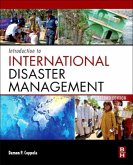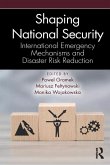Introduction to International Disaster Management, Third Edition, continues to serve as the leading comprehensive overview of global emergency management. This edition provides practitioners and students alike with a comprehensive understanding of the disaster management profession by utilizing a global perspective and including the different sources of risk and vulnerability, the systems that exist to manage hazard risk, and the many different stakeholders involved. This update examines the impact of many recent large-scale and catastrophic disaster events on countries and communities, as well as their influence on disaster risk reduction efforts worldwide. It also expands coverage of small-island developing states (SIDS) and explores the achievements of the United Nations Hyogo Framework for Action (2005-2015) and the priorities for action in the Post-2015 Framework for Disaster Risk Reduction currently under development. This useful, relevant text includes many changes that have occurred since the last edition for a better understanding of the rapidly advancing field of international disaster management.
"...manages to be both concise and sufficiently deep to be useful to the security practitioner who needs either a quick reference or a resource for more detail into the various subjects. Coppola's approachable writing style is informative and balanced. This book belongs in your professional library." --Security Management"...a whopper of a book for a whopper of a subject...it takes you through the hazards; the risks...and mitigation; then preparedness and response and recovery. " --Professional Security Magazine Online
"Damon Coppola's massive effort to present disaster management as an international endeavor from a practitioner's perspective combines the classic framework espoused by disaster researchers with the reality of the field. Yet the book incorporates basic information that has evolved in the field of nbsp;disaster management and places it within easy grasp for practitioners." --Alan Kirschenbaum, Journal of Homeland Security and Emergency Management, Volume 4, Issue 3 (2007)
"Damon Coppola's Introduction to international disaster management is a single volume sourcebook that makes excellent use of full colour graphics and has numerous inset boxes highlighting aspects of the topics under discussion. The book follows a logical progression starting with the history of disasters and ending with details of disaster management agencies (governments, NGOs, multilateral organisations), where they are located within national government structures, and what they do. The bulk of the book is given over to consideration of hazards, risks and vulnerability, and the four stages of traditional disaster management namely: mitigation, preparedness, response, and recovery. A final chapter deals briefly with special considerations in relation to disasters covering such diverse topics as the media, political will, donor fatigue, state sovereignty, climate change, terrorism, and pandemics. This book is an excellent starting point for the study of disaster planning providing both global perspective and local detail." --Colin Perry, The Brunei Times
"Disaster management is a discipline and a profession that is growing and evolving rapidly; and international disaster management is a subdiscipline. This text is intended as a guide and reference for students and practitioners involved at any level. The specifics of all facets of mitigation, preparedness, response, and recovery are covered clearly and in detail, beginning with general background and proceeding to the various types of hazards, assessment of vulnerability and risk (and disparities among countries), forms of structural and nonstructural mitigation, the practicalities of preparedness (communications, training, animal care, public warning), the complexities of international response, and the recovery period. Three chapters discuss the players: government agencies, nongovernmental organizations, and multilateral and international financial institutions. The concluding chapter covers special issues (sovereignty, distribution of relief, emerging epidemics, among other topics). Coppola is a well-seasoned practitioner and works now as a systems engineer with a disaster management consulting firm." --SciTechBookNews
"This monograph provides practitioners, educators and students with a comprehensive overview of the players, processes and special issues involved in the management of large-scale natural and technological disasters. The book discusses special issues encountered in the management of international disasters, and explains the various private, non-governmental, national, and international agencies that assist in preparedness, mitigation, response and recovery during national and regional events. Concentrating on the four major phases of emergency management - mitigation, preparedness, response, and recovery - the author deals with such timely topics as Hurricane Katrina, the 2004 Asian tsunami, and SARS. It also serves as a reference to governmental and other agencies involved in international disaster management activities." --MCEER Information Service
"Updated to reflect the latest data in global disaster trends, this second edition offers a comprehensive overview of the complex issues surrounding preparedness, response and relief during international disasters. It will be a useful reference for students, practitioners and anyone interested in international humanitarian response and recovery." --Foreign Service Journal
"Damon Coppola's Introduction to international disaster management is a single volume sourcebook that makes excellent use of full colour graphics and has numerous inset boxes highlighting aspects of the topics under discussion. The book follows a logical progression starting with the history of disasters and ending with details of disaster management agencies (governments, NGOs, multilateral organisations), where they are located within national government structures, and what they do. The bulk of the book is given over to consideration of hazards, risks and vulnerability, and the four stages of traditional disaster management namely: mitigation, preparedness, response, and recovery. A final chapter deals briefly with special considerations in relation to disasters covering such diverse topics as the media, political will, donor fatigue, state sovereignty, climate change, terrorism, and pandemics. This book is an excellent starting point for the study of disaster planning providing both global perspective and local detail." --Colin Perry, The Brunei Times
"Disaster management is a discipline and a profession that is growing and evolving rapidly; and international disaster management is a subdiscipline. This text is intended as a guide and reference for students and practitioners involved at any level. The specifics of all facets of mitigation, preparedness, response, and recovery are covered clearly and in detail, beginning with general background and proceeding to the various types of hazards, assessment of vulnerability and risk (and disparities among countries), forms of structural and nonstructural mitigation, the practicalities of preparedness (communications, training, animal care, public warning), the complexities of international response, and the recovery period. Three chapters discuss the players: government agencies, nongovernmental organizations, and multilateral and international financial institutions. The concluding chapter covers special issues (sovereignty, distribution of relief, emerging epidemics, among other topics). Coppola is a well-seasoned practitioner and works now as a systems engineer with a disaster management consulting firm." --SciTechBookNews
"This monograph provides practitioners, educators and students with a comprehensive overview of the players, processes and special issues involved in the management of large-scale natural and technological disasters. The book discusses special issues encountered in the management of international disasters, and explains the various private, non-governmental, national, and international agencies that assist in preparedness, mitigation, response and recovery during national and regional events. Concentrating on the four major phases of emergency management - mitigation, preparedness, response, and recovery - the author deals with such timely topics as Hurricane Katrina, the 2004 Asian tsunami, and SARS. It also serves as a reference to governmental and other agencies involved in international disaster management activities." --MCEER Information Service
"Updated to reflect the latest data in global disaster trends, this second edition offers a comprehensive overview of the complex issues surrounding preparedness, response and relief during international disasters. It will be a useful reference for students, practitioners and anyone interested in international humanitarian response and recovery." --Foreign Service Journal








